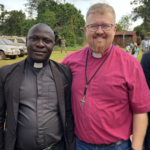
The Taliban’s Resurgence in Afghanistan: Come Lord Jesus
19
August, 2021
Hope
Tragedy
Afghanistan
Every week we pray, “keep our nation under your care.” This week, this prayer hit home for me.
What does it mean for an Aghan Christian to pray “keep our nation under your care?”
By now, you’ve probably seen the terrible news of the fall of Afghanistan to the Taliban. Wherever you land on this issue, one thing I think we can all agree on is the terrible implications for the Gospel and for the few Christians in that country.
I’ve been gripped by news articles documenting the events as they’ve unfolded.
The images of people desperate to escape, crowded planes, and panicked officials all point to what we know to be true. Darkness has once again folded over that region of the world.
A dear friend of mine recently shared with me just how many families have been impacted. It’s astounding to consider.
Let’s face it. It’s difficult to trust in God in overwhelming moments of despair.
I’ve been on the phone with several veterans, one who lost close friends in the war. Their families are mourning the loss of mothers and fathers who never made it home. The anger, despair, and hopelessness they feel are natural.
Haunting questions streak through their minds as they grapple with the reality of a failed mission, lost brothers and time lost.
Depression, hopelessness, and even suicide are genuine threats in the face of overwhelming defeat. But they do not have to define us.
Where is hope?
In these conversations, one question has repeatedly come to mind. “How long, O Lord?”
The Psalmist David asked this very question in Psalm 13. Listen to his words:
How long, O Lord? Will you forget me forever?
How long will you hide your face from me?
How long must I take counsel in my soul
and have sorrow in my heart all the day?
How long shall my enemy be exalted over me?
(Psalm 13:1-2).
Look at that last line: “How long shall my enemy be exalted over me?” In moments like this week, it can feel as our enemy has been exalted over us.
Whether it’s COVID-19, corrupt politicians, misbehaving clergy, the Taliban, or even personal problems, the Psalmist’s words seem to resonate with me — “how long, O Lord?”
As Christians, it’s easy to gloss over the world’s problems in the hope of the new Kingdom. We’re even encouraged to keep our eyes on eternity and Christ’s inevitable return. All of this is true.
Yet David did not point to these things. Instead, he pointed to something different. He says in verse 5, “I have trusted in your steadfast love.” The phrase “steadfast love” is the translation of the Hebrew word “hešed.” The term is translated in a variety of different ways depending on what version you are reading.
For us, all we need to concern ourselves with is the core meaning: God’s core character trait, faithful love.
David, a mighty warrior himself, placed his hope not on a distant future but rather in the faithfulness of God even in the middle of hopeless circumstances.
How long O Lord is an expectant prayer recognizing that apart from God’s intervening, David’s enemies would prevail.
Let’s face it. It’s difficult to trust God in overwhelming moments of despair.
When projects, missions, relationships, or ventures that we’ve poured all of our lives into fail, the natural human reaction is to mourn and grieve.
For our soldiers who paid the heaviest price of all with their lives, it’s even more appropriate to grieve the events of this week deeply.
As Americans, we’re raised on the social myth that we can accomplish anything and do anything if we just set our mind to it.
That’s not always true. And if left unchecked, it can lead to absolute ruin. The failed U.S. policy in Afghanistan once again reminds us as nation that just because we’re big and powerful doesn’t mean we’ll succeed.
Hope, meaning, or purpose isn’t sought after or gained in the pursuit of success as an end in itself but rather in the pursuit of knowing and being known by God.
As Christians, we must remind ourselves and our loved ones that failure is not the greatest of evils. Instead, it is selfish pride and contempt of God that leads to our ruin.
Nevertheless, this does not mean that we shouldn’t mourn when confronted with life’s greatest tragedies. Christ himself grieved over the death of his friend Lazarus. So we, too, mourn over the loss of life that we’ve born witness too.
So my prayer for every serviceperson and family member directly and indirectly impacted by the Taliban’s resurgence in Afghanistan is for them to find peace and comfort in the Lord’s Jesus who will one day conquer evil once and for all.
Until that day, we can only say “Maranatha. Come, Lord Jesus.”




